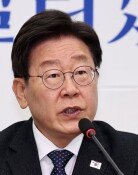NPS removes Hanjin chairman from Korean Air's board
NPS removes Hanjin chairman from Korean Air's board
Posted March. 28, 2019 07:43,
Updated March. 28, 2019 07:43
Hanjin Group Chairman Cho Yang-ho lost his board seat at Korean Air’s regular board meeting, which was held on Tuesday. At the meeting, 64.09 percent of shareholders voted for Cho’s reappointment that fell short of the required approval of two-thirds. It is the first time that a conglomerate chairman lost a board seat at a general shareholder’s meeting in Korea.
The National Pension Service played an important role in the vote on the day. NPS, the second-biggest shareholder of Korean Air with an 11.56 percent stake, decided against Cho’s reappointment through a committee meeting on Monday and Tuesday, claiming that Cho hurt] corporate value and shareholder rights. Chairman Cho has been charged with embezzlement and illicit business channeling to profit companies owned by family members. Some argue that Cho should be given the benefit of the doubt until the judiciary rules the final judgement as the verdict of the first trial is yet to come out.
Since its adopting the stewardship code last year, South Korea’s state pension fund has been actively exercising shareholder’s rights. Earlier, the NPS also voted against appointment of outside and inside directors in Samsung Biologics and Hyosung, and shunned activist fund Elliott’s dividend proposals for Hyundai Motor and Hyundai Mobis. It is likely that the NPS will continue to exercise shareholder’s rights for various matters such as unfair corporate supports, defrauding of business management and excessive payment to executives. Many businesses that have NPS as a shareholder are bound to keep their eyes and ears alert.
The NPS’s main purpose is to maximize Korean citizens’ pension fund, not to participate in business administration. Its yield of last year was negative 0.92 percent, a loss of six trillion won. As of late 2017, its average yield for the past five years was 5.19 percent, which is much lower than other major national pension funds such as Canada Pension Plan (12.02 percent) and the California Public Employees' Retirement System (10.4 percent).
Currently the NPS’s investment management is headed by the health and welfare minister, which is why it is swayed by the government or other political factors. It is hard to find right talent for the institution as it moved to a rural city and offers wages lower than the market average. As the NPS operates 640 trillion won for the Korean people, it needs to earn trust only through political neutrality, independence and expertise.







